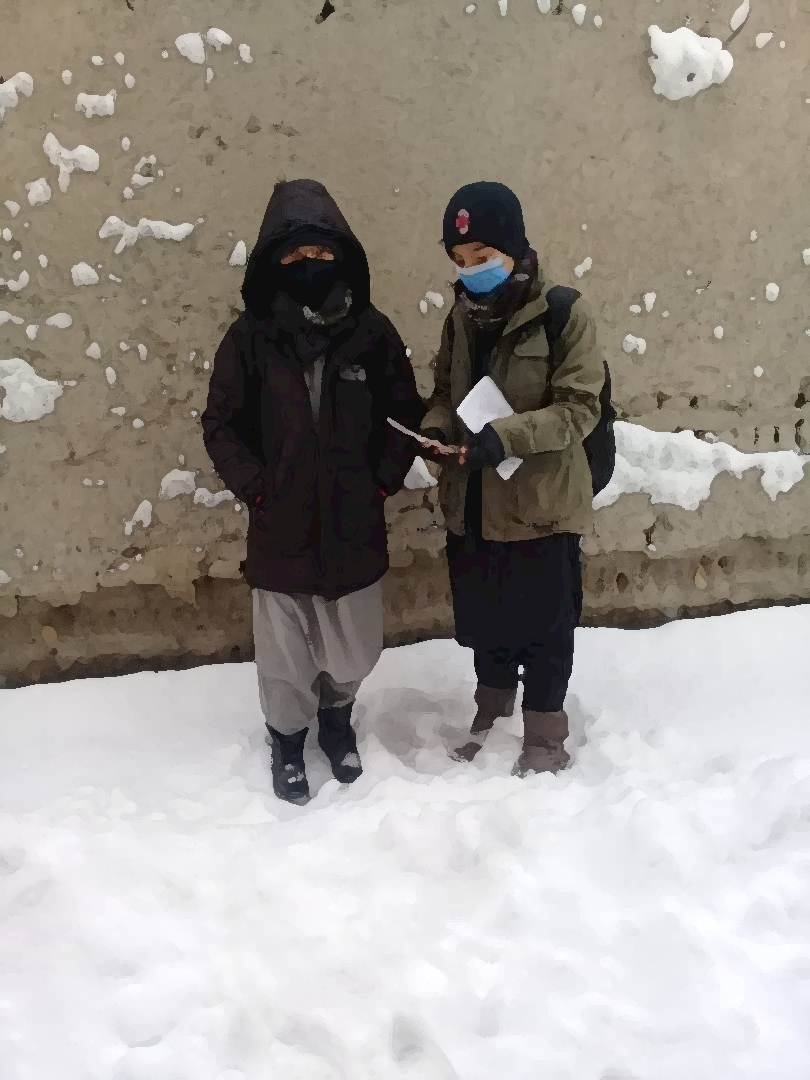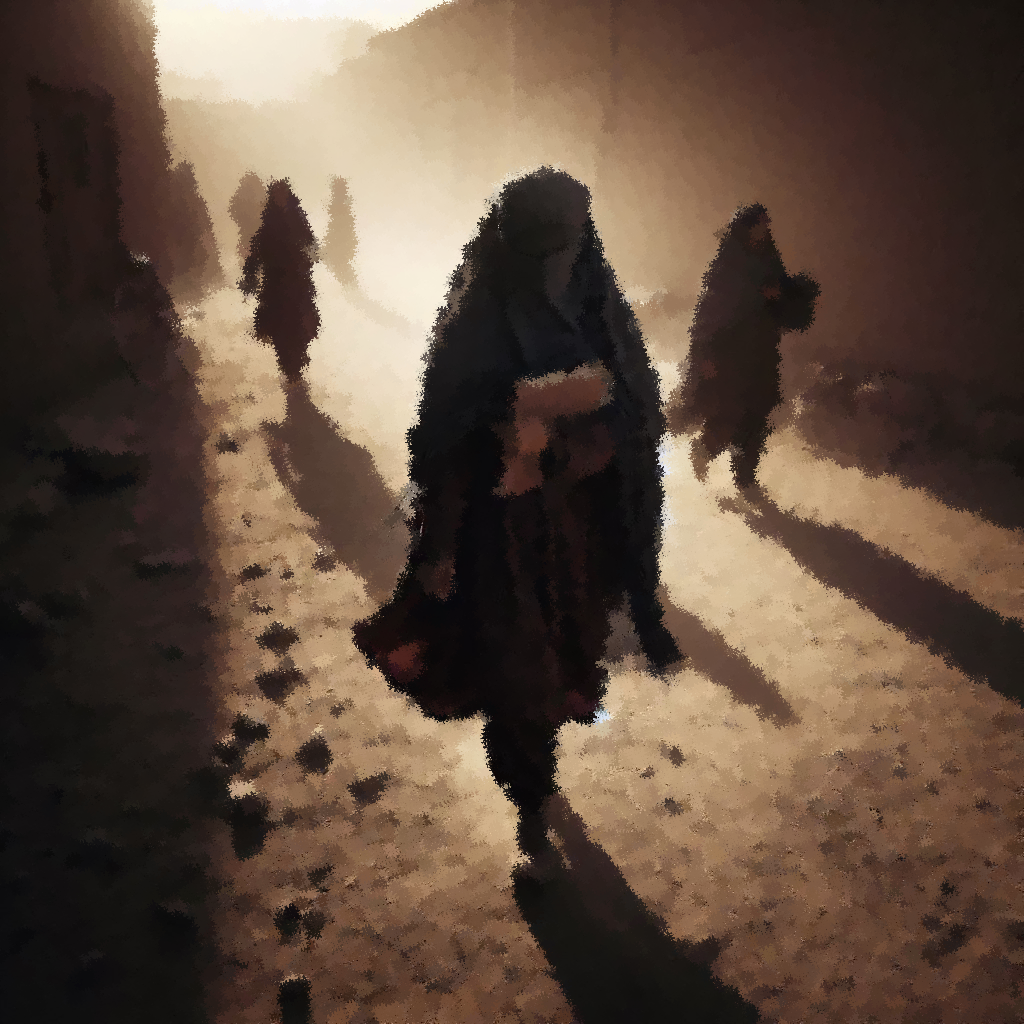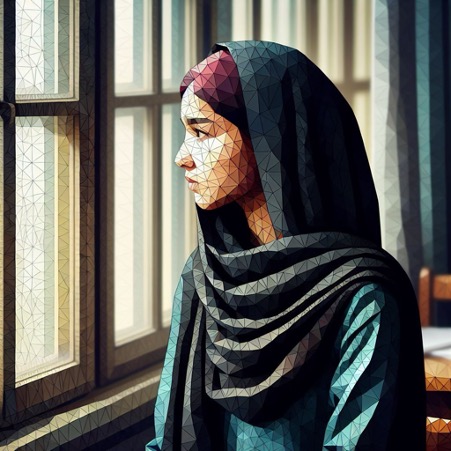To commemorate Women’s History Month, the Afghanistan Policy Lab at the Princeton School of Public and International Affairs has conducted interviews with eight courageous Afghan school-age girls in Afghansitan. These courageous individuals have been prevented from attending secondary school since the Taliban seized power in 2021. Their stories shed light on the stark reality faced by girls who once enjoyed fundamental freedoms and rights, such as the ability to attend school, participate in recreational activities, socialize with friends outside of their homes, engage in sports, and freely walk outside of their homes without a mahram (male chaperone.) Following the Taliban's takeover, unfortunately they have been deprived of these fundamental liberties due to the imposition of Taliban’s harsh restrictions. Despite the challenges, these resilient girls refuse to surrender their dreams and aspirations, and each of their stories is a testament to their resilience and courage. They utilize online tools to resist and fight back, as one of them bravely stated: “The Taliban have a strong fear of educated women because they know if a woman gets education, she won’t raise a Talib.” Empowering Afghan women through education stands as the antidote to the Taliban's oppressive regime.
The interviews were conducted via WhatsApp messenger. To ensure the safety of the girls, pseudonyms have been used in the stories.

"Every individual has the right to determine their attire, free from external dictates," she asserts.
Nevertheless, as a girl, Yalda finds herself stripped of these rights.
Weeping, she continues "At times, I wish I hadn't been born a girl in Afghanistan." Yalda
Yalda, age 17, rarely leaves her home due to the strict and oppressive policies enforced by the Taliban upon women and girls in Afghanistan. On occasion, when essential tasks arise such as a visit to the doctor, her mother accompanies her outside. Yalda's existence now revolves around the walls of her house and its courtyard. However, within this constrained space, she has built herself an expansive world using books and technology. The internet and technology have afforded her the opportunity to immerse herself in movies, podcasts, educational programs focusing on computer science and philosophy, two fields she holds dear.
Even prior to the Taliban's rule, Yalda struggled with anxiety and stress. Taliban’s return and being deprived of education only amplified her inner turmoil, leaving her feeling unsettled with darkness of depression creeping in. Over time, with the support of her family, particularly her mother, and her own research into depression and coping mechanisms, her mental state gradually improved.
Yalda was in ninth grade when the Taliban regained power by force in 2021. Throughout the past two years of the ban on education, she turned to self-study. Books, a laptop, and a mobile phone became Yalda's sanctuary, rendering the daunting circumstances inflicted by the Taliban somewhat bearable. Having previously acquired elementary English skills at a private language center, she embarked on self-directed English learning, ultimately attaining an advanced level. Presently, most of her reading materials, movies, and podcasts are in English.
Yalda's social interactions have transitioned from the physical realm to the virtual sphere, maintaining contact with friends through social media messaging applications. She has transformed these group interactions into learning opportunities for herself and her peers, establishing a book club where members summarize and discuss their readings. Philosophy holds a particular fascination for Yalda, prompting her aspirations to pursue it at university. She has already commenced reading philosophical works and follows coding tutorials on YouTube. Additionally, she has recently gained admission to an online program offered by a prestigious Afghan university. She awaits the commencement of her classes. For Yalda's safety, details regarding her university and online education program remain undisclosed.
Despite pledges of the Taliban's Ministry of Education that the ban on education for girls beyond the sixth grade would be temporary pending curriculum revisions aligned with Islamic law and Afghan culture, no action has been taken to reopen girls' schools over two years later. Even in the event of schools reopening for girls beyond the sixth grade, Yalda is not optimistic. She fears the Taliban's radical changes to the curriculum. She states, "Real Islam differs significantly from Taliban’s Islam. Yet, the Taliban seek to dictate/introduce their own interpretation of Islam into the curriculum."
Yalda believes in the right to individual free will, and strongly opposes the imposition of lifestyle and dress codes by others. She perceives the actions of the Taliban undermine individual freedoms and free will. Having experienced firsthand the repercussions of such Taliban-dictated rules, solely due to her gender, Yalda regards the freedom to exercise one's will as paramount. "Every individual has the right to determine their attire, free from external dictates," she asserts. Nevertheless, as a girl, Yalda finds herself stripped of these rights. Weeping, she continues "At times, I wish I hadn't been born a girl in Afghanistan." Despite all the adversities, Yalda hopes to get a scholarship and continue her studies in her favorite field outside of Afghanistan.

“When half of a country's population, which is women, are deprived of work and education, that nation never achieves peace.” Aliya.
In August 2021, when the Taliban started to hold control of Afghanistan, Aliya was 16 years old and in the ninth grade at school. The Taliban closed the doors of schools, and she was sent home. She has been waiting for the last two years for the schools to reopen, but they haven’t opened yet.
Determined to pursue education, Aliya and some of her classmates started to create an initiative to educate girls virtually. They launched an online education program for girls, and now, over 550 girls deprived of schooling attend the online academy launched by Aliya. She lives in one of the remote provinces of Afghanistan and from there manages this initiative.
The idea struck her when she herself participated in an online learning program. Later, she thought she could initiate a similar initiative for the girls of her province who were hit hard by the repressive policies of the Taliban and deprived of education.
Reflecting on her experience, she shared, "Last year, I enrolled in an online English language program, which was launched by a boy. Then I thought to myself, if he can do it, why can't I? I learned from his experience and I shaped my idea accordingly.” Initially, she consulted with her classmates, and seven out of 14 of them, expressed willingness to assist her in this work. Then she reached out to her teachers, and some of them also expressed readiness. Now, five months since the program has began, they have 30 teachers, 16 staff, and over 550 students. Remarkably, all of them are carrying out this work using their personal resources, and all voluntarily.
Recently, Aliya and her team have decided to upgrade their academy to an online school. This school is intended to provide free education for seventh to twelfth-grade girls students, who have been deprived of schooling. The curriculum follows the Pre-Taliban educational standards. Classes are taught via Google Meet and Telegram presentations. However, Aliya emphasizes that the main challenge for their program is the slow internet speed. “Internet issues in Afghanistan are significant. We are trying to find solutions to minimize this problem."
When asked how she maintains hope and motivation to work in circumstances where the Taliban have excluded women from society and confined them to their homes, Aliya says: "It has been almost three years since we have been out of school, but we haven't lost hope during this time, and we will not surrender in the future either. If we can't work outside the home, at least with online education, we keep educating ourselves. Darkness doesn't always prevail. Light will come. If it doesn't come this year, it will come next year. We are hopeful and we will strive for education."
Aliya is a powerful young girl and she has also planned for the day when the schools will reopen. Alongside teaching school subjects and English, she has launched a preparatory class for the university entrance exam. "We have this program so that when schools start and we are promoted to the twelfth grade, we can still take the entrance exam."
Aliya disagrees with the Taliban’s claim of bringing peace to the country. She mentioned many people, especially women, continue to face mental issues amid the current situation. According to her, “when half of a country's population, which are women, is deprived of work and education, that nation never achieves peace.”

“We pretended to be boys so we could attend classes”, Aisha and Marwa
When the Taliban seized control of the country, Aisha and her sister Marwa were tenth and ninth-grade students, respectively, both excelling in their studies. The day the Taliban announced their ban on girls' education beyond sixth grade, that night both sisters wept until the dawn. The denial of education left them both heartbroken and ill in bed. Their elder sister, who had completed her university education before the Taliban's return and was employed in a private media outlet, enrolled them in an English language learning center to uplift their spirits. Through language classes and engaging in handicrafts temporarily, their mental well-being gradually improved. However, their newfound happiness was short-lived. In late 2021, the Taliban also closed private educational centers for girls, once again plunging Aisha and Marwa into despair.
The Taliban's stance regarding girls' education in private educational centers is not uniform across all regions and may vary from one province to another. In some areas, the group has allowed private educational centers to teach girls above the sixth grade without official orders. However, in some areas, like Aisha and Marwa’s hometown, the Taliban have forbidden girls from attending private educational centers too. Left with no other option for their thirst of gaining education, Aisha and Marwa decided to disguise themselves as boys and attend English language classes. This time, by wearing their brother's clothes and pretending to be boys, they returned to the educational center from which they had previously been expelled for being girls and sat in the English language class. Aisha recounted, "We were scared, but we went to the school office and registered under the names of Ahmad and Mahmood. And we were seated in the boys' class."
Their little tactic to be able to access education, their most basic right, was soon enough to be discovered by the center’s manager. "One day the manager of the center called us to his office. Seeing us dressed as boys, his voice trembled and started crying. We cried too. They told us to ensure no one learns about this so we can continue our studies." Marwa remembered.
Aisha and Marwa's classmates persisted in being curious as to why the two always came to class with their hats and masks on. Some of their classmates ridiculed them, mocking their girlish voices. Eventually, one day, one of the teachers asked Aisha to remove her hat, but she did not. From that day on, their classmates understood that they were not Ahmad and Mahmood but Aisha and Marwa. Despite facing mockery and bullying by some of their classmates, the two remained resolute to continue their English language class until the end.
After the class, Aisha and Marwa's lives have been restricted to the confines of their home. Aisha draws, and Marwa weaves handicrafts. During these activities, they occasionally review their past lessons to alleviate the boredom and anguish of being prisoners at home.
The attempts of Afghan girls concealing themselves as boys to receive education are not unprecedented in history. In the previous Taliban era, too, girls used to wear male attire just to be able to leave their house and often earn a living. During the first rule of the Taliban, girls and women faced a similar situation, banned from learning and working. It is unfortunate to see the same situation occur one more time and young women like Aisha and Marwa, who once were the top in their class and determined to pursue their higher education are now confined to their homes.

“I couldn't believe that I could no longer study because I was a girl in Afghanistan.” Zarina
Zarina, 21, graduated from high school just before the fall of Kabul. She vividly remembers that day when the Taliban announced that girls were prohibited from attending educational institutions, universities, parks, gyms, and more. Zarina recalls it as the most terrible day of her life. She imagined herself in hell; for her, it was like the end of the world, and nobody cared about the situation of women and girls in Afghanistan.
“I couldn't believe that I could no longer go to school because I was a girl in Afghanistan,” she said. Despite this huge setback, she refused to let disappointment hold her back. She focused on improving her English skills and music. She found a music instructor to teach her a local musical instrument called “Dambura.”
Before the Taliban takeover, Zarina dreamed of studying business and becoming a businesswoman in the future. Currently, there is no way for girls to continue academic education in Afghanistan under the Taliban’s regime. Yet, she remains hopeful for change in the Taliban’s policies so she can pursue her education.
“Girls in Afghanistan are like anywhere in the world — full of potential and brightness. But life for women and girls under the Taliban is nothing more than being slaves of religious extremists in their homes.”
As she commutes for English and Dambura classes she faces numerous challenges. With each passing day, the Taliban’s grip on women’s rights in Afghanistan expands, further restricting Afghan women from exercising their fundamental rights. Zarina covers up in traditional Afghan attire that does not really match with the Taliban-mandated hijab. So, her commute from home to the class is filled with fear. She fears facing harassment for the way she currently wears her hijab and dresses. Another obstacle for her is the absence of professional and experienced teachers because many of the experienced teachers have left the country. Lastly, she fears explosions in her hometown because of her identity, as a Shia-Hazara woman, being the target of ISIS-K.
Zarina fights all these damaging challenges posed by the Taliban to the Afghan culture by choosing to learn Dambura as a way to keep the tradition and values of the Hazara people alive. Playing Dambura is like releasing her stress and sad feelings; like forgetting about what has happened to Afghanistan. She is proud of herself because she sees her instrument as a part of her protest against the Taliban.
Since January 2024, women girls have been arrested by the Taliban in Kabul and various provinces for not observing proper hijab, so she has to hide her face and wear long clothes. She has expressed living in constant horror and fright and sometimes feeling exhausted for putting up a fight.
The Taliban arrested some of her friends, and it was so hard for her to discuss with them the fear, horror, and terror they had been going through. She can only hope for not being ever arrested, and that the situation one day changes for women and girls in Afghanistan so she along with millions of other girls can go back to school and experience freedom.

“I tell my friends to read books, because it helped me when I felt extremely helpless, and
I was sure that it would help them to get out of that state of mind, too…” Fatima
Fatima, nineteen years old, enrolled in a comprehensive educational program to improve her English and learn how to apply for scholarships to attend higher education abroad. At noon on August 15, 2021, as she excitedly prepared to start the first day of classes, her mother called and urged her to stay home as the Taliban had entered the city.
“My mother was outside. I called my mother to tell her that I was going to the center. My mother said in a tone that she had never spoken to me with before: ‘You are not going anywhere!’ She said that the Taliban had taken over the city.”
All the stories that Fatima had heard on television or through her parents about the brutal conduct of the Taliban two decades prior came to life in her mind: the Taliban engaging in suicide attacks, stoning men and women, flogging women in public view on the street, flogging men for having short beards. “I felt like I had fallen into a deep hole. No matter how much I screamed and asked for help, no one would respond. It was such a feeling of helplessness.”
For the first week after the Taliban’s arrival, Fatima and her sisters did not dare to go on the street. “Those first seven days passed like seven years for me. I thought that our life was over and that no good was going to come. I thought the Taliban would return and do something to us like they did to our mothers before 2001 because they hated women so much. God, why are we sinners from their point of view? Why?”
Fatima’s older sister secured an evacuation for the family, but as they made their way to the airport on August 26, 2021, a large explosion at the entrance killed 13 American marines, while at least 60 Afghans were killed and dozens more injured. The airfield closed on August 31, 2021, and the last American soldiers left Afghanistan.
With the departure of the American forces, Fatima lost hope. As the Taliban implemented increasingly stricter policies, she suffered severe depression. “I cried at night and wrote during the day. It was a level of depression I had never experienced before.” Fatima’s family played a critical role in her recovery. When Fatima’s depression was at its peak, her mother took her to a bookstore. The bookseller looked surprised when he saw two women enter to buy books. As Fatima recalled, the bookseller told them that it was surprising, in a situation where people were wondering how to save lives, two women were looking for books.
These books provided a critical source of motivation for Fatima. As her mental health improved, she enrolled in several online learning programs. And with the help of WhatsApp, she gathered a group of her friends virtually to share the stories and lessons that helped her improve her mental state. “I used to tell my friends to read books, because it had helped me during my helpless days, and I was sure that it would help them to get out of that state of mind, too. Our WhatsApp group was not only a place for telling stories and heartaches but also an educational platform." Books and the Internet soon became a place of refuge for Fatima.
The work of people who provided Fatima and thousands of other girls with opportunities to learn online inspired her to begin a book reading competition to encourage her peers to read. She sent a proposal to individuals abroad and received funding, but educational centers in Afghanistan were unwilling to host the competition because education for girls was prohibited by the Taliban. Constrained by the restrictions of the Taliban, Fatima successfully launched the competition for 100 boys.
On the day of awarding the winners of the competition, she took the risk and went to give a speech to the participants. All were boys. She got a lump in her throat when she saw no girl. After the program was over, she felt a sense of happiness that she had never experienced before. As soon as she got out of the classroom where the competition was held, she called her mother and let her know that she made it as her mother was worried about the risk her daughter was taking to go to a male gathering.”
When Fatima reviews her personal journals, she realizes that she has come out of a deep hole that she once thought confined her. Having recently been admitted to a university in Italy, Fatima stands in a place where the future seems both promising and possible, which has been gained through constant fight and not giving up on her dreams no matter how challenging they are.

“…In reading Malala's book, I realized how resilient a girl can be, and naturally,
it encourages me and gives me hope to continue fighting until the end.” – Toba
Until tenth grade, Toba had proven herself as a hardworking student with excellent grades. She devoted her time and energy to one day achieve her dream of earning a top score on the nationwide public university entrance exam, inspired by Salgy and Shamsia, two girls who received the highest scores in 2020 and 2021, respectively.
This dream was destroyed when the Taliban took power and banned girls’ education after sixth grade, barring Toba from graduating and pursuing her favorite field of study, political science, with the hope of becoming a politician and supporting the people of Afghanistan.
After the takeover, Toba was teaching English in a private educational center. That abruptly ended two months ago when the Taliban started arresting girls on the streets in Kabul for wearing “bad hijabs.” Toba now rarely leaves her house out of fear of being arrested and the suffering it would cause her family. However, she uses an online platform for her teaching and learning. Each morning when she wakes up, she performs household chores before sewing handicrafts with her mother to sell them to cover the expenses of her online courses and study materials. Now, these online courses are the only opportunity that she has to interact with peers and classmates and reduce her stress and anxiety. "The only thing that encourages us to continue this struggle is the existence of these phones and computers and the Internet. If this space is not there, absolute darkness will rule in our lives,” she said.
For Toba, self-help and psychology books act as a driving force that motivates her through difficult situations. “Becoming”, written by Michelle Obama is the last book Toba read: “Most of the books I read are motivational. These books tell the stories of globally known women who have gone through extremely difficult situations. Notably, in reading Malala's book, I realized how resilient a girl can be, and naturally, it encourages me and gives me hope to continue fighting until the end.”
Almost all girls in Afghanistan, including many of Toba's classmates, are deprived of the opportunities that Toba experiences. Only girls with access to and knowledge of how to use smartphones, computers, and the Internet can participate in online education. Girls without these opportunities are forced to give up and unwillingly agree to early marriages.
Toba is one of the girls who managed to get a scholarship for virtual learning. She has the support of her family. However, Tuba wants to go and experience the university in the conventional way, which is in-person. As he she hopes that one day she might be able to leave Afghanistan and live in an environment where she has her freedom, she currently struggles for a life not entirely shattered by darkness and misery. Continuing to seek educational opportunities, preferably outside the country, she strives to turn her dream of becoming a female politician into reality.

“According to God and his messenger, seeking education
is obligatory for every woman and man.”
Eighteen-year-old Khadija once dreamed of attending medical school at Kabul University, but she now goes to a private midwifery institute out of necessity, just to get out of the house and feels that she has not deviated from her path yet. Khadija was in 11th grade when the Taliban seized control of the country and prevented her from attending school. During the interview, Khadija burst into tears when she explained how much she had worked hard to find her way to her favorite field. While crying, she continued: “In school, I was the first-position student from first grade all the way up to 11th. My dream was only to attend medical school at Kabul University.”
Some private midwifery institutions remain open, allowing girls to attend while adhering to Taliban-directed hijab guidelines.
Khadija’s world is limited to her room in the house, the class at the midwifery institute, and the route between these two places. Since almost three months that the Taliban have started detaining girls from the streets, accusing them of not having the proper hijab, Khadija goes out with fears of being detained, and harmed: “When I go out, the fear of being detained and harmed by the Taliban has always been with me.”
Khadija has not seen her friends for a long time now. She sometimes talks to them through social media messenger apps. Some of her friends, as she recalls them the luckiest ones, have left the country, and a considerable number of them have been forced into early arranged marriages: “Several of my classmates got married last year. I asked them why they had done it at a such young age. They said that without going to school what else could they do? They got married last year, and now they have kids.”
The last time Khadija participated in any recreational activities was last summer when she visited Band-e-Amir Lake in Bamiyan for three days with her family. Band-e-Amir is one of the most attractive sightseeing spots in Afghanistan, with thousands of people across the country visiting each summer.
Soon after her visit, the Taliban banned women’s entry to Band-e-Amir. The Taliban claimed that, according to Islam, women cannot be seen by men other than their family members. Now, only men will be allowed to see this beautiful lake. The year they came into power, 2021, the Taliban prohibited women and girls from accessing all recreational parks.
Khadija, who is familiar with the rules and principles of Islam regarding women, believes that the Taliban’s acts are against the teachings of Islam. According to her, the reason behind the Taliban's harsh treatment of women is that they fear educated women.
“According to God and his messenger, seeking education is obligatory for every woman and man. Taliban are afraid of educated women because they know that an educated woman will not raise Taliban. They know that an educated woman will raise educated children, not those who believe in the language of guns.”

"I want the world to see the disparities and pains of Afghan women in the face of
unimaginable hardship. I want to tell their stories.”
The Taliban’s rapid takeover of Kabul in August 2021 sent shockwaves through Salma’s world. Only in the ninth grade, she found herself in the midst of midterm exams when the news broke. To Salma, the Taliban represented absolute evil, a force that viewed women as adversaries and wielded flogging, gunfire, and explosions as their tools of control. The very thought of their rule drove Salma to think of taking her life: “I was so shaken that thoughts of suicide came into my mind,” she revealed.
The initial measures taken by the Taliban—barring girls from secondary schools and expelling women from government positions—were only the beginning of their campaign to erase women from public life. Despite these restrictions, private educational centers and universities remained open to girls for a short while. But as the Taliban tightened their grip, they systematically stripped away women's freedoms, rendering them prisoners in their own homes.
In the darkness, a beacon of hope emerged for Salma: online education. With access to high-speed internet, smartphones, and laptops, girls like Salma could defy the Taliban's efforts to keep them ignorant. Although a majority of Afghan girls were denied this opportunity, Salma was fortunate to have the unwavering support of her family and the means to access online learning resources.
Salma’s mental anguish gradually gave way as she seized every opportunity that came her way, enrolling in online English courses, participating in a book club for Afghan girls run by an American woman from a thousand miles away, and even completing a journalism program in 2023. Despite the challenges she faced, she maintained a disciplined schedule, engaging herself in a world of virtual classrooms, animations, and books. And amidst it all, she tirelessly pursued scholarships to study abroad in English-speaking countries, for the hope of breaking free from the prison that confines her now.
While Salma enjoys the support of her family, many of her peers are not as fortunate. Economic hardships and cultural norms often force girls into early marriages, robbing them of their dreams and aspirations. Salma recounts how four of her classmates, barely teenagers, have already been married off against their will. "Regrettably, very few girls receive the support of their families and have access to the internet and books. Take, for example, eight of ten families in my neighborhood cannot afford internet costs due to poverty. Those with the means and resources to assist Afghan girls in learning and offering them words of hope are akin to rescuing them from the edge of collapse."
Salma refuses to be silenced by the darkness that surrounds her. Before the Taliban's rise to power, she dreamed of becoming a doctor. Yet, in the face of adversity, her dreams have taken on a new shape. Now, she aspires to become a journalist and tell the world to see the disparities and pains of Afghan women in the face of unimaginable hardship.

